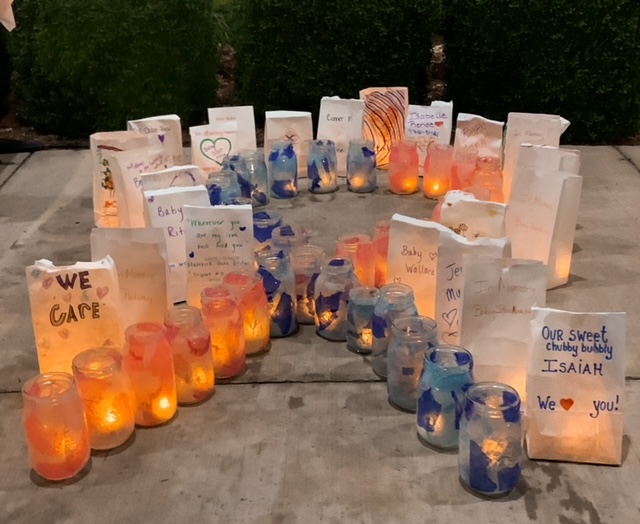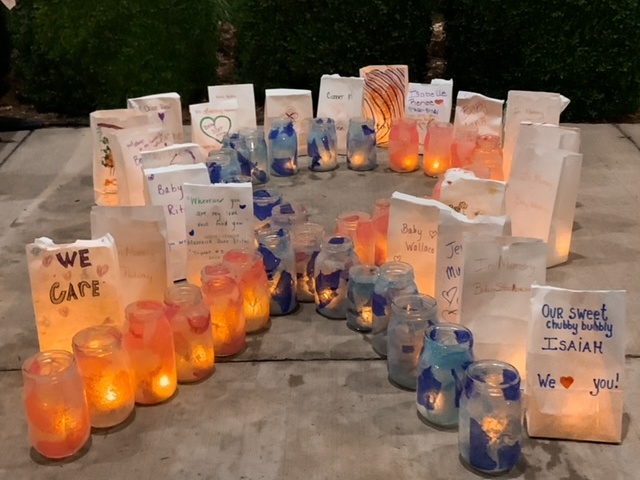MIDLAND, Mich. – Each year, more than a million families in the United States experience a miscarriage, stillbirth, or death of an infant. Yet because these events can be emotionally difficult to discuss, there is little public awareness, so families may not always get the support they need. October is Pregnancy and Infant Loss Awareness Month, a time to show support for these families, to highlight available resources and to build understanding of how family, friends and the community can help.

If you visit a MyMichigan Health facility during the month of October, you may notice staff wearing pink and blue ribbons or special tee-shirts to show their support. MyMichigan Medical Centers in Alma, Midland and West Branch will also participate in the International Wave of Light, a worldwide remembrance event on October 15, 7 to 8 p.m. During this time, candles will be lit at the medical center entrances to honor babies gone too soon and their families. Patients, staff and community members are welcome to attend.
Resources for Grieving Parents
Your primary care doctor or OB/Gyn can be a good first contact to help you address the physical and emotional impact of a loss and to identify resources that can help.
MyMichigan Hospice offers grief support for individuals and families who have lost a loved one, including education, support groups, short-term counseling and referrals to community professionals for longer-term follow-up. To find a local grief and loss support group, visit www.mymichigan.org/supportgroups or call (800) 862-5002.
There are many local and national nonprofits that specialize in helping families through infant and pregnancy loss. Their services range from resources and materials that discuss what families can expect during the grieving process to real-time support groups – both in person and online, to financial assistance with funeral and other expenses. Some organizations focus on certain bereaved family members, such as parents or siblings, or on specific causes of perinatal death. Consider calling your local 2-1-1 hotline to identify agencies in your area that may provide targeted grief services.
What to Say When Someone Loses a Child
When pregnancy or infant loss occurs, loved ones are often uncomfortable or unfamiliar with what to say or do. Some well-meaning people may even say things that are more hurtful than helpful. Experts recommend you keep condolences simple, follow the family’s cues, and ask about their preferences if you are unsure.
Tips:
- Acknowledge their loss in short, simple phrases, such as, “I’m sorry for your loss.” Or “I imagine this must be painful for you.” Offer to listen if they want to talk. It’s also okay to simply admit that you don’t know what to say.
- Ask whether it is okay to talk about the baby and to use the baby’s name.
- People may think of miscarriage as “no big deal,” but the value of a life is not proportional to the time spent on earth. When a family loses a child, they lose the entire future they had dreamed for themselves and that child; a lifetime of milestones and memories. In some cases, they may not have another opportunity to become parents, which can compound their grief.
- Avoid statements that downplay their emotions, tell them how to feel or attempt to find a “silver lining” in their grief, such as:
- Everything happens for a reason.
- God must have wanted your special angel to be with him.
- You’re young. You can still have another child.
- At least now you know you can get pregnant.
- It’s fortunate you didn’t really know him/her.
- At least you weren’t that far along.
- Remember the father, siblings and other family members. The focus tends to be on mothers, but the whole family may need your support. Be aware that men may feel the need to “be strong” which can impede their grieving process.
- Offer to help with specific tasks. People who are grieving may not be able to identify their needs or ask for help. You can offer to help with caring for other children, preparing meals, doing housework, funeral preparations, notifying extended family or friends, or creating a special memento or ritual to remember the baby. Remember that help and support may be especially needed after other helpers have moved on.
- Acknowledge them as parents. This is often overlooked if they don’t have living children, yet they are parents and should be supported and addressed as parents.
- Remember them in years to come. Call, send a card, or offer to spend time with them on milestone days. Grief does not end with the delivery or memorial service.
You can find more helpful tips at these and other websites:
- https://www.marchofdimes.org/complications/helping-parents-whose-baby-has-died.aspx
- https://www.parents.com/pregnancy/complications/miscarriage/what-to-say-to-a-friend-who-has-lost-a-baby/
- https://starlegacyfoundation.org/how-family-and-friends-can-help/
- Laker Men’s Basketball Handle Kuyper 88-55 - December 23, 2024
- MYWAY Sault Bridge Brawl & NEMWA Regional Results - February 22, 2024
- Crawford County Prosecutor clears State Trooper in the fatal shooting of man earlier this month - February 23, 2023



